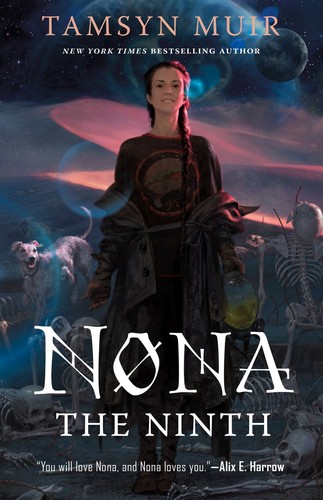Harrow the Ninth and Nona the Ninth by Tamsyn Muir 📚
I read the first book in this series (Gideon the Ninth) some time ago, and actually read the second (Harrow the Ninth) at some point but didn’t write a post, and now as soon as I finished the third volume (Nona the Ninth) I went back and re-read the first two in order to try and understand what the heck was going on. Yes, it is that complicated. It seems possible that I will need to do it again once the next (and perhaps concluding?) book comes out. So the following comments cover all three published volumes (the story so far) and may contain spoilers at least for the first.
Much of my confusion results in the structure of the two narratives; each book continues the timeline of the previous from the point of view of Harrowhark Nonagesimus but (and here is the major spoiler) it turns out that Harrow’s point of view is an extreme example of an unreliable narrator, not because Harrow is a liar (she is loyal and honest) but because her fundamental personality has been changed and modified by earlier events to the point where she herself doesn’t really remember what has happened to herself and her companion/rival Gideon. More of my confusion has to do with which characters are dead and which are still living, as in the cosmology of the series death is still final but is a transition rather than an ending.
And as the story progresses we are also learning more of the backstory of this cosmology. In Harrow we meet the God-Emperor and his remaining Lyctors, near immortal necromancers of immense power, opposed by immense Resurrection Beasts created in the deep past as a result of a vague necromantic cataclysm. The author does a good job of presenting these ten-thousand-year-old characters as a strange mix of human and transhuman, although that transhumanity and Harrow’s mental confusion does make it difficult to infer what their true motives are. The final chapters resolve some mysteries but introduce several new ones, as it becomes obvious that Harrow and Gideon have been caught up in the long range plots of the immortals and are only beginning to understand their roles (as was I as a reader).
But when we get to Nona it turns out that (spoilers again) Harrow’s partial reintegration at the end of Harrow has gone wrong and she now has to relearn almost everything, having lost much of her memory of previous events. Some of the deep backstory of the Emperor is revealed in literal dream sequences, which I have have to assume can’t be relied on as a source of truth. Several of the characters from the previous stories appear here in new roles, and in the end it isn’t at all clear what has happened to any of them, including Harrow. Will the next volume resolve this question? We can’t really rely on Harrow to know what is going on, having traveled through so many transformations, obscure statements from immortals, confusing dreams, and several trips to and from the afterlife.
It’s hard to nail down the central theme of these linked stories; at one level we have an Emperor with strange powers opposed by a rebellion; at another level a coming of age story for Harrow and Gideon, young people with their own emerging powers thrown into a battle they don’t understand; and then there is the entire question of death and what comes after, the question of what each character owes to other people or society, and what each is prepared to do in order to gain or retain absolute power over the scattered worlds of humanity. Death and necromancy are the absolute power in this universe, and it seems that absolute power corrupts those who use it in strange and inhuman ways; can Harrow and her friends overcome that inhumanity without themselves becoming the enemy they are opposing?
Clearly I recommend these books, but I also suggest waiting for the next before even starting on the first. Also make sure to read all of the additional content at the end of Harrow before starting Nona.


